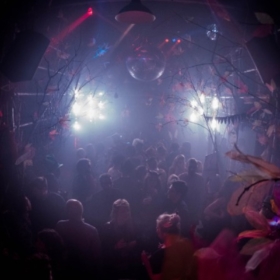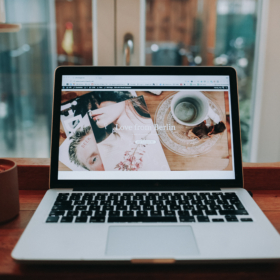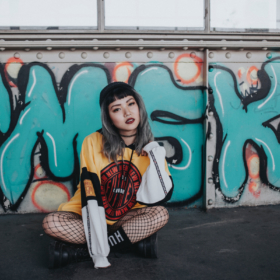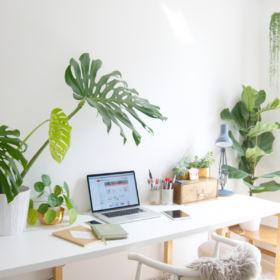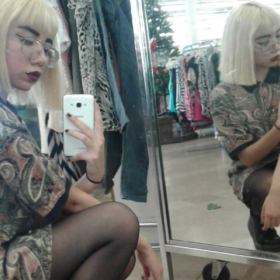Jenn Hart is a twenty-something writer, poet and editor based in Bristol. She regularly performs at spoken word events and punk shows across the UK, and recently toured Northern Europe with anarcho-folk singer Efa Supertramp and Petrol Girls’ Ren Aldridge. Her book Better Watch Your Mouth is available here. Read our interview with her below.
1. When did you first start writing poetry?
I started writing poetry when I was very young, about 11 or 12. I was very interested in creative writing and had a wild imagination from a young age. I wrote short stories and fan fiction throughout my teens and poetry was another avenue that I explored, though quite casually. It helped me to work through some issues I had because of undiagnosed (at the time) Borderline Personality Disorder. I had a rough childhood and sought to express myself and reach out via poetry and stories. As I got older I started reading more poetry, such as Sylvia Plath and Carol Ann Duffy, and began a love affair with this bold and unspoken style.
2. What do you like to talk about in your work?
I focus on whatever interests me at the time. My book Better Watch Your Mouth is a collection of poems about women in history and fiction. I studied history at university and this is where I really discovered feminism, I became interested in exploring untold stories of women. Other poems are about various houses I’ve lived in with people, different relationships, especially friendships with other women. I also write for the DIY punk scene, specifically about my experiences of sexism. My poem Let Loose Lucy is a performance piece that I do at punk shows to try and get people to understand gender dynamics on and off the stage and critique the scene in order to make it better.
3. How has your poetry career progressed since you started out?
I’m one of those poets who enjoys listening and learning from other poets. I read more than I write. So when I started writing and taking it more seriously in my early 20’s I was really conscious about improving, editing and also supporting the community that was supporting me (I think this is HUGELY important for all poets to do). I started performing at poetry slams, open mics, and local festivals, but because a lot of my work is directly addressing the punk community and because I really wanted to have visibility there I started performing at gigs, house shows and alongside bands. Poetry and punk have a long history together and I really wanted to make my mark in the community this way. I found my identity as a poet there.
Finding your voice takes time, self awareness and the ability to critique and edit your work. Whilst I am open to doing sets at poetry events and since my book came out I have sought more of these, I mostly do DIY shows. I recently finished the WRIOTE tour with Efa Supertramp (Welsh-speaking acoustic folk artist) and Ren Aldridge (hardcore feminist punk band Petrol Girls front-person) which was a tour we organised and booked ourselves and I loved it. I also feel validated by having my book now. Before Better Watch Your Mouth I had released a zine of my poems called Scraped Knees and Sob Stories (2013) and had submitted poems to various zines including She Grrrowls (a feminist-focused poetry night). I’ve also done some collaborations with punk bands which has been really fun.
4. You work with a lot of feminist writers and groups. Would you describe your work as inherently feminist, too?
I think I have some pieces which are feminist, and most of them embody the spirit of women in some way or another. I am a feminist and I believe in furthering the narrative of women, trans and non-binary, LGBTQ+ and BAME not just in my own work but in supporting other writers. I can only write from what I know, so I cannot speak on behalf of any communities beyond that. It is for them to tell those stories. I guess what I am trying to say is that my work is feminist but with the limitations of the fact that I am white able-bodied cis gendered woman.
5. Women in both the literary and the alternative music scene have had a rough ride in the past – they’ve been ignored, brushed aside, and told they’re ‘just not good enough’. How do you feel audiences and publishers respond to female writers in the 2010s?
In my experience as a poetry publisher, the majority of poets I like are those who write from a place of truth. Women, POC, LGBTQ+ seem to have a better grasp at their identity and are able to push that in their work, which makes it powerful. But like in any scene, women are still burdened with ingrained preconceptions of being ‘female poets’, not just ‘poets’. Social media, Youtube, Twitter etc has massively changed the way in which we experience and interact with poetry, and I think there are some amazing examples out there such as Agnes Torok, Harry Baker, Bridget Minamore and Hollie McNish. But we are in danger of feminism being a brand now – it’s becoming a commodity instead of a fight for justice and I think some of these amazing poems are used against them in a way. If at the very least feminist poetry is reaching out to people and making them think then that’s terrific, but I worry that it is becoming more of a genre rather than expression.
6. Have you ever felt discriminated against as a female poet?
Not really, I’m a very loud and outspoken person! The only time I’ve been made to feel uncomfortable is when people shout over me at gigs, or steal the mic to ask ‘what about the menz?’. One guy actually screamed ‘sexist bitch!’ in my face at a gig once. I kept going. But just because I haven’t experienced it, doesn’t mean that others don’t. I think maybe if I did poetry slams I might feel a bit more like that, but I’m comfortable where I’m at.
7. Do you think that’s something to do with artists and creatives carving out scenes for themselves away from the ‘straight white male’ hegemony?
I think with the rise of new wave feminism and identity politics in particular, instead of trying to integrate and break into male spaces, these oppressed communities have taken and made their own space. They are still small, but they are strong in belief and I think that counter-culture has kind of melted into layers of culture that bleed into each other, bridges are still being built and negotiated. Identity politics is good because it provides recognition for those minority groups who need to be heard and given a platform. However, it has also made everything very stifling. People are afraid to have conversations for fear of offending others; there is a general fear of being called out and no one wants to fuck up, even though everyone does, and it’s all part of the process.

Love LFB Blogazine? Then help keep us alive! Join us on Patreon.

